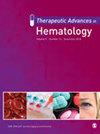难治性晚期真菌病病例报告:莫甘单抗成功治疗并改善患者生活质量
IF 3.1
3区 医学
Q2 HEMATOLOGY
引用次数: 0
摘要
放线菌病(MF)是最常见的皮肤T细胞淋巴瘤,以斑块、斑块以及晚期肿瘤和红斑为特征。多达三分之一的早期 MF 患者可能会发展为晚期疾病,预后较差,通常需要对皮肤外受累进行全身治疗。最常报告的体征和症状是疼痛、瘙痒、脱屑和皮肤发红,其中瘙痒是最令人烦恼的症状,对患者的健康相关生活质量(HRQoL)产生深远影响。这些皮肤病的症状和体征可能与湿疹和银屑病等其他良性炎症性皮肤病的症状和体征重叠,因此,MF 患者的诊断延误很常见。此外,识别患者是否具有对预后有不利影响的特征(如大细胞转化或毛囊变异)也是一项重大挑战。我们报告了一例 75 岁女性患者的病例,她先被误诊为湿疹,后又被误诊为红斑狼疮,结果 4 年都没有接受 MF 治疗。2018年9月,患者最终被正确诊断为多发性骨髓瘤[IIIB期(T4 N1 M0 B1)]。患者接受了数次系统治疗;然而,她对治疗没有反应,也不能耐受治疗。由于缺乏治疗反应,2021 年 7 月,她开始接受莫加穆利珠单抗治疗。莫加穆利珠单抗是一种抗CC趋化因子受体 4 抗体,其疗效已得到证实,并获准用于既往接受过一次或多次系统治疗的成人 MF/Sézary 综合征患者。治疗一周后,患者的血液迅速出现完全反应,4 个月后,患者的皮肤也出现完全反应。患者对莫加莫利单抗的耐受性很好,并报告说她的 HRQoL 有了显著改善。完全应答 1 年后,停用了莫干单抗。本病例强调了早期准确诊断骨髓纤维化的必要性,以启动疾病特异性治疗,以及在治疗这种疾病时考虑患者 HRQoL 的重要性。本文章由计算机程序翻译,如有差异,请以英文原文为准。
A case report of refractory advanced-stage mycosis fungoides: successful treatment and improved patient quality of life with mogamulizumab
Mycosis fungoides (MF), the most common form of cutaneous T-cell lymphoma, is characterized by patches, plaques, and, in advanced stages, tumors and erythroderma. Early-stage MF may progress to advanced-stage disease in up to one-third of patients, conferring a worse prognosis and typically requiring systemic treatment for extracutaneous involvement. The most frequently reported signs and symptoms are pain, pruritus, scaling, and skin redness, with pruritus, the most bothersome symptom, exerting a profound impact on patients’ health-related quality of life (HRQoL). These dermatologic signs and symptoms can overlap with those of other benign inflammatory dermatoses, such as eczema and psoriasis, and therefore, diagnostic delay is common in patients with MF. Moreover, identifying patients with features adversely affecting prognosis (e.g. large-cell transformation or folliculotropic variant) is a significant challenge. We report the case of a 75-year-old female patient who was misdiagnosed with eczema and then pityriasis rubra pilaris and consequently did not receive treatment for MF for 4 years. The patient was eventually correctly diagnosed with MF [stage IIIB (T4 N1 M0 B1)] in September 2018. The patient received several systemic treatments; however, she did not respond to or tolerate the treatments. Due to lack of treatment response, in July 2021, she was initiated on mogamulizumab, an anti-CC chemokine receptor 4 antibody with demonstrated effectiveness and licensed approval for adults with MF/Sézary syndrome who have received one or more prior systemic therapies. Treatment rapidly led to a complete response in blood after 1 week and in skin after 4 months. Mogamulizumab was well tolerated by the patient, who also reported a significant improvement in her HRQoL. After 1 year in complete response, mogamulizumab was discontinued. This case highlights the need for accurate and early diagnosis of MF to initiate disease-specific treatment and the importance of considering patient HRQoL when treating this condition.
求助全文
通过发布文献求助,成功后即可免费获取论文全文。
去求助
来源期刊

Therapeutic Advances in Hematology
HEMATOLOGY-
CiteScore
4.30
自引率
0.00%
发文量
54
审稿时长
7 weeks
期刊介绍:
Therapeutic Advances in Hematology delivers the highest quality peer-reviewed articles, reviews, and scholarly comment on pioneering efforts and innovative studies across all areas of hematology. The journal has a strong clinical and pharmacological focus and is aimed at clinicians and researchers in hematology, providing a forum in print and online for publishing the highest quality articles in this area.
 求助内容:
求助内容: 应助结果提醒方式:
应助结果提醒方式:


